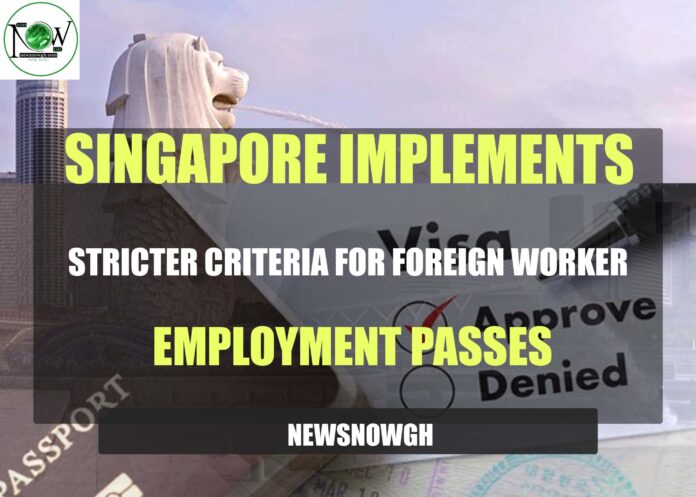Singapore Implements Stricter Criteria for Foreign Worker Employment Passes
With effect from January 1, 2025, Singapore has updated the requirements for Employment Pass (EP) applications. Changes to professional requirements, educational institution eligibility, and pay standards are part of the revamped COMPASS points system, which aims to draw in qualified international workers while making sure they complement the domestic workforce.
Updated qualifying requirements have been implemented by Singapore’s Ministry of Manpower (MOM) for its Complementarity Assessment Framework (COMPASS), a point-based assessment system that is essential for all Employment Pass (EP) applications.
These measures, which go into effect on January 1, 2025, are intended to improve Singapore’s evaluation of foreign professionals applying for jobs there, especially managers, executives, and other high-level roles.
What is COMPASS and How It Works
Introduced in September 2023, the COMPASS system assesses EP applicants in two phases:
Stage 1: Reaching the EP Qualifying Salary
Before being eligible for EP, candidates must first fulfill a minimum salary requirement that is compared to the top third of local professional salaries by age. This qualifying salary has been updated for 2025:
- General Sector: SGD 5,600 is now the minimum salary.
- The minimum wage in the financial services sector has increased to SGD 6,200.
Step 2: Assessment of COMPASS Points
Candidates must pass COMPASS, which assesses both personal and company-related qualities unless they are exempt. This evaluation guarantees that EP applicants contribute to a robust local core and offer significant talent to Singapore’s workforce.
Revised Requirements for Professional and Educational Credentials
Candidates’ qualifications are evaluated by COMPASS using a point system. With effect from January 1, 2025, MOM has revised the 10-point professional credentials list and the 20-point educational institution list for the COMPASS evaluation.
1. Educational Credentials
Under COMPASS Criterion 2, candidates with a bachelor’s degree or above from accredited universities can receive 20 points. Points differ according to the group of institutions:
All faculty members at Group A institutions are eligible for 20 points. Institutions that serve as examples include:
- Chulalongkorn University (Thailand)
- Boston University (USA)
- Freie Universität Berlin (Germany)
- City University of Hong Kong (Hong Kong)
- Indian Institute of Technology Delhi (India)
- Indian Institute of Technology Bombay (India)
- McGill University (Canada)
- Kungliga Tekniska Högskolan (KTH Royal Institute of Technology) (Sweden)
- King’s College London (UK)
Group B Institutions: Twenty points are awarded to certain faculties. To make clear which programs within these schools are qualified, MOM will supply a comprehensive list.
2. Professional Qualifications
Under COMPASS Criterion 2, candidates who possess certain professional qualifications can receive 10 points. Among the recognized certifications are:
- Chartered Accountants Australia and New Zealand (CA ANZ)
- Association of Chartered Certified Accountants (ACCA)
- Institute of Singapore Chartered Accountants (ISCA)
- Institute of Chartered Accountants of India (ICAI)
Updates on Salary Benchmarking for EP Applications
Singapore has revised its salary benchmarking rules for EP applications to conform to the COMPASS framework:
- All initial EP applications submitted after January 1, 2025, will be subject to new wage criteria.
- It will be mandatory to adhere to the updated salary criteria for EP renewals that expire on July 1, 2025.
However, the present pay benchmarks (set in May 2023) will continue to be in place until December 31, 2024. The May 2023 pay benchmarks also remain applicable for extensions that expire between September 1, 2024, and June 30, 2025.
Effect on Applicants for EP
Both new and renewing EP applicants will be impacted by these changes. Foreign professionals must make sure they meet the new requirements by carefully reviewing the amended COMPASS criteria. Employers need to plan appropriately and be aware of these developments as well.
Conclusion
A progressive approach to integrating foreign talent is shown in Singapore’s new Employment Pass (EP) structure, which strikes a balance between local and international competence. These adjustments seek to create a strong, well-rounded workforce that can satisfy the demands of a worldwide economy and position Singapore as a highly competitive location for skilled professionals.
Follow us on Newsnowgh.com to stay updated on the latest information regarding work permits, visa application processes, paths to permanent residency, and visa-sponsored employment.


